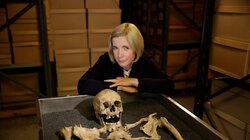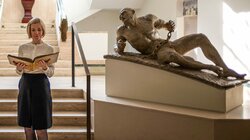What really happened to the Princes in the Tower? Lucy Worsley uncovers the story of the two boys whose disappearance in 1483 has led to centuries of mystery and speculation.
The story of the princes in the tower is as familiar as a fairy tale – two innocent boys murdered in their beds at the behest of their evil uncle Richard so he could seize the throne for himself and be crowned King Richard III. But there is very little evidence about what happened in 1483, and no real proof that the boys were murdered. They simply disappeared from sight – and from known historical record.
The two princes, Edward and Richard, lived during the Wars of the Roses, a decades-long fight over the English throne between the house of Lancaster and the house of York. Edward IV, the boy's father, was the first Yorkist King. His eldest son, Edward, was destined to inherit the throne – and this fact entirely shaped his young life.
Edward was just 12 when his father died and he succeeded him as King – but his age meant he wasn't considered quite ready to rule. Edward IV had appointed his brother Richard to be the young Kings protector - but not everyone was happy with this arrangement. What followed was a tussle for control between Richard and the Queen's family, the Woodvilles, revealing fascinating ideas about childhood, and the nature of politics and power in medieval England.
Uncle Richard had young Edward and Richard installed at the Tower of London 'for their own protection', but when a priest declared that the boys were actually illegitimate, Richard was next in line to the throne, and it was he who was crowned King Richard III.
As far as we know, the boys were not seen again. The gaps in the historical record have fuelled 500 years of speculation. Lucy speaks to historian Prof Tim Thornton, who has found evidence that may back up one account of what really happened to them, written by Thomas More a generation after the events.
In the light of all the evidence she's had access to, Lucy makes up her own mind about Richard's guilt. But importantly, this story has also revealed much about the lot of a royal child in medieval England. And one thing Lucy is certain about is that the story of the Princes in the Tower shows how interpretations are never fixed, there's always the possibility that new evidence will come to light, and that this story will continue to fascinate us.










